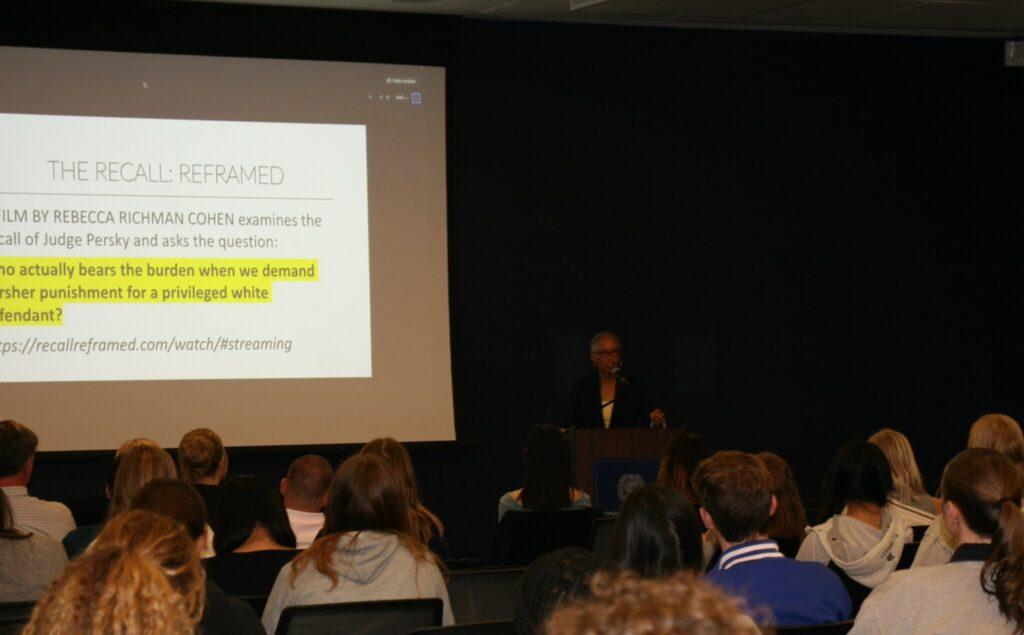Judge LaDoris Cordell discussed the main problems of the U.S. legal system and her recently published memoir at a Nov. 8 event hosted by Georgetown Prison Outreach.
At the event, Cordell, the first African American woman judge to serve in the Superior Court of Northern California, read aloud short excerpts from the book and answered questions from the audience. Cordell covered topics such as economic barriers, jury diversity, the politicization of judge elections, threats to judicial independence, racial disparities in sentencing and personal challenges she has faced.
Cordell said the purpose of “Her Honor: My Life on the Bench … What Works, What’s Broken, and How to Change it” is to inform readers about the world of state trial court judges. She wrote about the variety of cases, ranging from adoptions to criminal cases, which she presided over during her nearly 20-year tenure as a judge.
“Most people have no idea about what it is that state trial court judges do,” Cordell wrote to The Hoya. “I give readers a look at a judge’s decision-making process by describing actual cases over which I presided.”
Cordell said she aimed to give readers of her book a more in-depth look at the actual work judges do beyond television portrayals to get a broad range of audiences interested in law.
“The television court shows don’t come close to letting the public know of the serious and important work of trial court judges,” Cordell wrote. “Her Honor is a book for everyone — legal people and non-legal people, alike.”

Beyond her judicial service, Cordell was also the first lawyer to open a private law practice in East Palo Alto, Calif. In 1978, Stanford Law School appointed her assistant dean for student affairs, and she implemented a successful minority admissions program.
Cordell provides an insider account of the strengths and flaws of the U.S. legal system in “Her Honor.”
At the event, Cordell discussed a range of problems in the U.S. legal system that she covers in “Her Honor,” including judges who are ill-prepared to preside in our mental health courts, prosecutors who use peremptory challenges to whitewash juries and the recall of judges who have followed the law by ill-informed voters. She proposed solutions such as replacing judicial elections with nonpartisan merit selection commissions, which would improve judge quality.
Ellie Kemper (SFS ’25), the advocacy director of Georgetown Prison Outreach, said “Her Honor” not only identifies and explains with great precision some of the most significant barriers to justice system efficacy, but also delineates actionable solutions to these problems.
“Judge Cordell’s discussion of jury composition and judge elections effectively highlights the economic discrimination embedded in the legal system. Particularly, the lack of a nationwide financial compensation standard for jury service significantly impedes jury diversity, which can have a significant effect on legal outcomes,” Kemper wrote to The Hoya.
Réka Blakemore (SFS ’24), the president of Georgetown Prison Outreach, said Cordell serves as a model for Hoyas hoping to make a difference in the legal field.
“We all have a lot to learn from Judge Cordell’s story. She stands up for what she believes in and balances fighting for justice within the system and advocating for change from outside of it,” Blakemore wrote to The Hoya.
Blakemore said Cordell’s experience as a judge has allowed her to develop nuanced, creative ideas on incarceration and the judicial system.
“She has very interesting ideas about how to ensure the quality of judges without politicizing the position through elections that incentivize the mass incarceration of Black, Brown, and poor communities,” Blakemore wrote.
Cordell said moving forward, the U.S. legal system requires ongoing efforts to ensure equality and fairness for all.
“There are wonderful legal principles that are the foundation of our legal system. Our challenge is to make those principles apply equally and fairly to all,” Cordell wrote. “Our legal system is still a work in progress.”




















